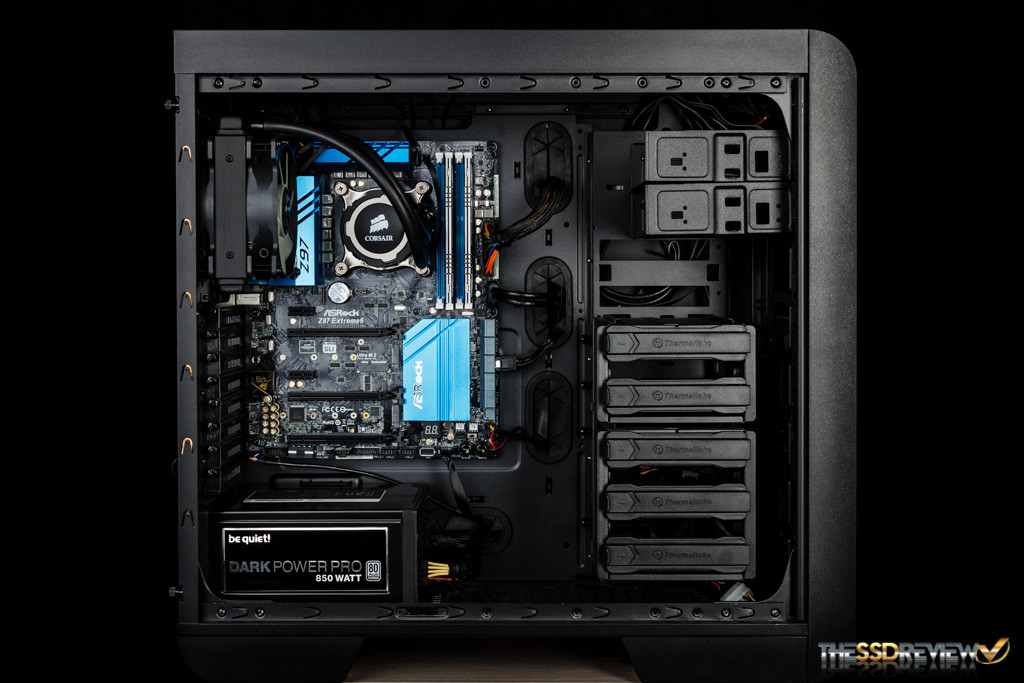TSSDR TEST BENCH AND PROTOCOL
SSD testing at TSSDR differs slightly, depending on whether we are looking at consumer or enterprise SSDs. For consumer SSDs, our goal is to test in a system that has been optimized with our SSD Optimization Guide. To see the best performance possible, the CPU C states have been disabled, C1E support has been disabled, Enhanced Intel SpeedStep Technology (EIST) has been disabled. Benchmarks for consumer testing are also benchmarks with a fresh drive so, not only can we verify that manufacturer specifications are in line but also, so the consumer can replicate our tests to confirm that they have an SSD that is top-notch. We even provide links to most of the benchmarks used in the report.
SYSTEM COMPONENTS
This Test Bench build was the result of some great relationships and purchase; our appreciation goes to those who jumped in specifically to help the cause. Key contributors to this build are our friends at ASRock for the motherboard and CPU and be quiet! for the PSU and cooling fans. Also, a big thank you to Thermaltake for the case and Kingston for the RAM. We have detailed all components in the table below and they are all linked should you wish to make a duplicate of our system as so many seem to do, or check out the price of any single component. As always, we appreciate your support in any purchase through our links!
| PC CHASSIS: | Thermaltake Core V51 |
| MOTHERBOARD: | ASUS Z170 Sabertooth Mark 1 |
| CPU: | Intel Core i7-6700K |
| CPU COOLER: | Corsair H75 |
| POWER SUPPLY: | be quiet! Dark Power Pro 10 850W |
| SYSTEM COOLING: | be quiet! Silent Wings 2 |
| MEMORY: | Crucial Ballistix Sport DDR4 2400MHz |
| STORAGE: | Samsung 850 Pro |
| OS: | Windows 10 Anniversary 64-bit |
| IRST DRIVER: | 14.8.0.1042 |
BENCHMARK SOFTWARE
The software in use for today’s analysis is typical of many of our reviews and consists of Crystal Disk Info, TRIMcheck, ATTO Disk Benchmark, Crystal Disk Mark, AS SSD, Anvil’s Storage Utilities, PCMark Vantage, and PCMark 8. We prefer to test with easily accessible software that the consumer can obtain, and in many cases, we even provide links. Our selection of software allows each to build on the last and to provide validation to results already obtained.
Crystal Disk Info is a great tool for displaying the characteristics and health of storage devices. It displays everything from temperatures, to the number of hours the device has been powered, and even to the extent of informing you of the firmware of the device.
In Crystal Disk Info, we can see that SMART is supported and there are quite a few useful metrics one can monitor, including total reads and writes, temperature, and more. It doesn’t list TRIM, but as you can see below, TRIM does work. The firmware we are testing today is CS203020.
We’ve covered TRIMcheck in the past. It is a great tool that easily lets us see if TRIM is actually functioning on a SSD volume in your system.
As can be seen in the screenshot above, TRIM is indeed working.
ATTO Disk Benchmark is perhaps one of the oldest benchmarks going and is definitely the main staple for manufacturer performance specifications. ATTO uses RAW or compressible data and, for our benchmarks, we use a set length of 256mb and test both the read and write performance of various transfer sizes ranging from 0.5 to 8192kb. Manufacturers prefer this method of testing as it deals with raw (compressible) data rather than random (includes incompressible data) which, although more realistic, results in lower performance results.
Initial results with ATTO are surprising. While this drive is rated for up to 2.75GB/s read and 1.5GB/s write, here it is demonstrating 3GB/s read and 2.3GB/s write! Don’t hold your breath though, this may be an artificially inflated result due to ATTO’s use of 100% compressible data. The controller could be utilizing some clever programming in order to achieve these results. Let’s see what our next benchmarks have to say.
 The SSD Review The Worlds Dedicated SSD Education and Review Resource |
The SSD Review The Worlds Dedicated SSD Education and Review Resource | 


4K QD1 read IOPS tells me most likely not Micron flash.
Probably WD/Toshiba slight chance even Hynix.
Googling the NAND print reveals other SSD reviews that identify this as a Toshiba 64GB 15nm MLC package.
As long, as it is double sided, it’s no deal for many slim ultrabooks.
Can you give us a specific of that?
I wonder how it would behave with some cooling. Maybe problem with heavy loads lies in overheating ? Maybe this ‘m2 shield’ stuff could help. If so then with minimal added cost its perfect.